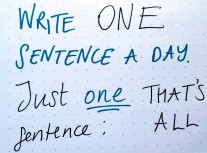 I once had a very simple writing goal: “Write ONE sentence a day. Just ONE sentence, that’s all“. That prompt was intended less to create a word count, but instead to just get my butt in the chair. Surprisingly the biggest barrier I discovered to writing is putting my backside in a chair and actually starting to write. Once I got going, I can barely stop. It’s a secret we all know, but not one we readily accept to be true.
I once had a very simple writing goal: “Write ONE sentence a day. Just ONE sentence, that’s all“. That prompt was intended less to create a word count, but instead to just get my butt in the chair. Surprisingly the biggest barrier I discovered to writing is putting my backside in a chair and actually starting to write. Once I got going, I can barely stop. It’s a secret we all know, but not one we readily accept to be true.
Don’t look for the ‘should’ goals
Once I realised I just needed to put my butt in the chair, it became easier to set more challenging goals. Yet a lot of the time, I have to admit, these goals didn’t help my writing ambition even though they sounded like the right ones: write that novel; submit to competitions; send things to agents. Instead these goals I felt I should be accomplishing meant my writing became artificial and too much like a chore. So much so it was like pushing a boulder up a hill. I was writing simply to tick the box I’d set up for myself, rather than because I loved the craft
The reason was that I lost sight of what success actually means to me. I don’t write to tick a box, or say that I’ve written. I write because I want to create interesting stories that prompt emotion or reflection in the reader. By confining my writing efforts to arbitrary tasks I inadvertently lessened the significance of why I wanted to write in the first place.
Set your own goals
 So, in order to set realistic, achievable, and exciting goals (after all, if it’s not going to be exciting why do it?) they have to appeal to my own intrinsic drivers as a writer. For me, I never feel as high as when the story from my imagination has made it onto the page and has the potential to engage a reader. Therefore, when I set my writing goals now I always make sure I appeal to this desire to create that story, and the feeling I want to produce in the reader.
So, in order to set realistic, achievable, and exciting goals (after all, if it’s not going to be exciting why do it?) they have to appeal to my own intrinsic drivers as a writer. For me, I never feel as high as when the story from my imagination has made it onto the page and has the potential to engage a reader. Therefore, when I set my writing goals now I always make sure I appeal to this desire to create that story, and the feeling I want to produce in the reader.
I have found with the right goals I’m more energised and confident about my writing. By making sure my goals are aligned with my values and drive to write, my belief that I can achieve my dream of not just getting published, but of making a career as an author is boosted. So it’s not about the ‘should’ goals, it’s about ‘my’ goals. If you’ve set a goal and then aren’t excited by it, or don’t want to even try it – then you’ve set the wrong goal; one that isn’t aligned with your desire to write and won’t encourage you to commit and succeed.
But why set goals at all?
Sure, a lot of writers get by simply by putting that backside in the chair and just writing everyday. But, that in itself is a goal – even if it’s not written down anywhere. And, if you don’t set any goals, how are you monitoring your development and improvement as a writer? How will you even know if you are moving the in the right direction – more specifically, how will you know if your actions are taking you toward your writing dream, and not further away from it?
While I might know what is the big goal in my life, I have numerous smaller goals that I have to meet on the way to make that happen. This is when it’s a good idea to recognise the difference between ‘Easy wins’ and ‘Stretch goals’.
Easy wins
An easy win is something that I do to keep my momentum going when I’m feeling sluggish or uncertain. This might be a minimum word count for the novel (an ‘easy’ 500 words in 30 mins); submitting an existing story to a new competition; or even just committing 20mins to some plotting or character development on paper. They’re things that don’t take much effort, and come as close to ‘box ticking’ as I get with my writing. The difference is the way I frame them:
- Minimum word counts contribute to that story I desperately want to tell.
- Submissions help get my work out in the world to connect with readers.
- Plotting and character work are elements I love about the writing process.
What is important is how I describe the goal rather than the goal itself. I phrase it so that it will appeal to me. That’s what makes the difference between a writing ‘should’ and my own tailored goals. Then, working on these easy wins reinforces my confidence and increases my self-belief.
Stretch goals
Once I understood how to phrase my goals, that’s when I started to set ‘stretch goals’. Now, I love stretch goals. The benefit of them is that you rarely lose – either you push yourself to achieve them and succeed; or you do your best and fall short but end up with more than you could have imagined if you’d just set an easy win.
A recent stretch goal was to write a full draft of my novel in seventy days. Having done NaNoWriMo for eight years, I know I can stick to the pace so, I set my daily word count and off I went. I had a chart on my wall, tracking my progress and an outline of my novel that I was so looking forward to writing. I’d done the prep work, I knew my characters, I worked out when things needed to happen, and so I just sat down to write it. But I would never have stuck with it if I hadn’t known why I was doing it and what excited me about it.
A word about rewards
Generally we’ve been conditioned to associate reward with success. Success itself can be its own reward, but the effort that we put into something is just as important and should be recognised as such. Therefore, as much as you might intrinsically know what drives you and why you are writing the story you are, a little reward now and then never hurts.
When I was writing my WIP in seventy days, I broke it down into some easy wins with a clear reward system to celebrate my commitment. It was as simple as a sticker on my wall chart for reaching my target, or the promise of chocolate biscuits if I did two twenty-minute writing sprints. This helped boost my confidence and encouraged me to keep going.
But when it comes to bigger goals and the rewards there, I have one rule:
Reward EFFORT not results
If I had sat down to write every day for seventy days and not reached my target of 90,000 words, or finished my story sufficiently this would not have been a failure. It was a journey, encouraging me to commit to my WIP and challenge myself to write more, not a test I had to pass.
Rewarding your efforts because you are showing up consistently, putting in the work, and committing to your goals every day deserves recognition and reward. The same goes for short story submissions and competitions; for each rejection I receive, I reward myself. Not only because it takes the sting out of the rejection but because I’m putting my work out there. While I have very little control of the outcome, I did take action to achieving my goal to share my stories, and I want to celebrate that.

Achieving the impossible
If you can figure out the why of your own writing dreams, then you’ll find it that much easier to set goals that you will want to commit to and achieve. And once you start rewarding your efforts as the success, you’ll create a positive environment to nurture further writing goals. You never know, perhaps this will lead to you attempting things you never thought possible…and yet, somehow, you’ll discover they are.
Now Try This!

- Identify some easy wins and practice phrasing them in ways that will excite your writer’s spirit.
- Don’t say ‘I will write everyday’ – try ‘I want to be the writer who loves to write every single day’.
- Make it fun, tap into why you write and use that.
- Now, decide on some rewards.
- If you write something everyday, what will you do to celebrate?
- If you write everyday for a whole week, then what?
- And imagine what amazing reward you could have if you make it a full month with an unbroken chain of writing?
- Once you’re accomplishing these regularly, add in a single stretch goal.
- Don’t overload yourself.
- Make sure you’re rewarding efforts not results here.
